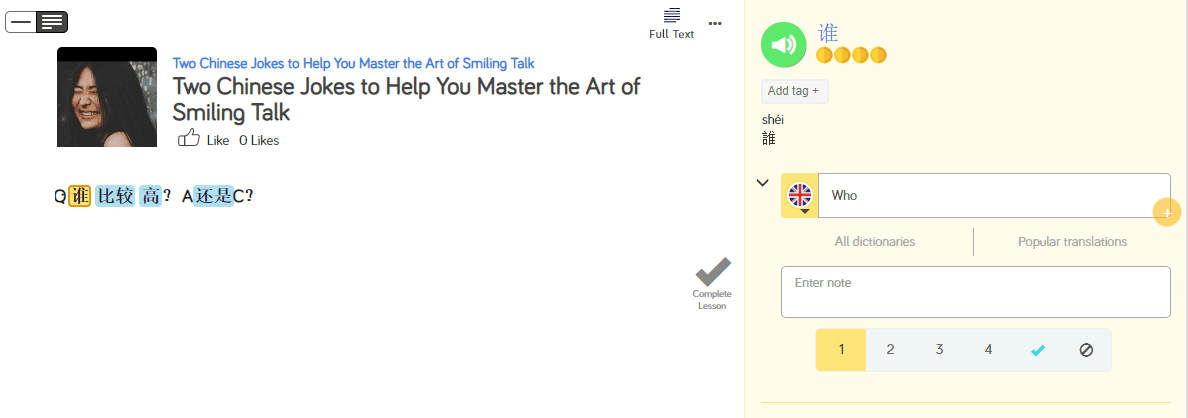Two Chinese Jokes to Help You Master the Art of Smiling Talk
Otherwise known as 笑话 (xiàohuà) or literally, “smiling talk”, in Mandarin, Chinese jokes are a great way to put a smile on anyone’s face while learning to appreciate both the beauty and culture behind the language.
While it is not certain as to when exactly the first Chinese joke was invented, it is certain that Chinese people are just about as funny as everybody else on this planet. Just in a slightly different way…

Chinese Joke Characteristics
Because Chinese humor is based mainly around linguistic components (such as puns and double entendres) as opposed to slapstick and satirical components as commonly seen in British and American comedies, you may get the impression that Chinese people do not have a sense of humor.
However, if you listen carefully to the sounds of these jokes and consider their meanings, you will find that Chinese people actually do. In fact, if done right, learning Chinese jokes can also give you an excuse as to why you forgot to finish your homework last night.
我开玩笑吧!我开玩笑吧, 老师!I’m kidding! I’m kidding, lǎoshī !
Anyway, tóngxuémen, without further ado, here are two Chinese joke examples in order to help YOU master the art of smiling talk. Are you ready?
The ABC or D Joke
Q: 谁比较高?A还是C?
(Shuí bǐ jiào gāo?A hái shì C?)
A: C, 因为,A比C低。
(C, yīn wéi,A bǐ C dī)
Translation:
Q: Who is relatively taller? A or C?
A: C because, A is lower than C.
In this example, A比C低 has two meanings. On the one hand, it literally translates to “A is lower than C.” However, when pronounced in Mandarin Chinese, the last sentence sounds like the letters, ABCD. In other words, A比C低 is both a double entendre and a pun because it can either mean “A is lower than C” or “ABCD.” ABCD! Get it?

The Deer Telephone Number Book Joke
小熊对小兔说:“我要给猴子打电话,但是不知道她的号码。”
(xiǎo xióng duì xiǎo tù shuō: “wǒ yào gěi hóu zi dǎ diàn huà, dàn shì bù zhī dao tā de hào mǎ.”)
小兔说:“你去问小鹿吧!”
(xiǎo tù shuō: ”nǐ qù wèn xiǎo lù ba!”)
小熊问:“为什么他会知道?”
(xiǎo xióng wèn:”wèi shén me tā huì zhī dao?”
小兔答:“因为他是通讯鹿”
(xiǎo tù dá: ”yīn wèi tā shì tōng xùn lù!”)
Translation:
Little Bear says to Little Rabbit,”I want to give Monkey a call, but I do not know her number.”
Little Rabbit says, “You can go ask Little Deer for it!”
Little Bear asks, “Why would he know it?”
Little Rabbit answers: “Because he is the phone book”
A little bit more challenging compared to the last joke, I know. But basically, the joke behind this joke is that since the final character in the original Chinese phrase for “phone book”(通讯录, , tōng xùn lù) , 录, sounds similar to the word, 鹿, which means “deer” in Chinese, it would make sense as to why a deer would be a phone book. After all, 鹿(lù) and 录(lù) are homophones. So 鹿(lù) equals 录(lù)! Get it?

Okay, kù! So where do I go from here?
Regardless as to what level your Chinese is at (don’t worry, remembering Chinese words isn’t too hard), learning Chinese jokes is a great way to make new friends, exercise your brain, and make you more of a cunning linguist all at the same time.
Also, if you want a fun and easy way to learn Chinese online, you can use LingQ (available for both Android and iOS). You can import all the Chinese jokes you find online and decipher them instantly. Importing is done with a click of a button, it’s that easy. Once your content is imported, you can highlight different words and save their meanings. Using LingQ, you get to study everything in context rather than one character at a time so things move quicker. Good luck.

***
Author’s bio: Athena Zhang Baker has been studying Mandarin Chinese since she was 11. As of now, she is learning bits and pieces of other languages in addition to Chinese and creating Japanese anime themed glossaries on the side.

